
The Nigerian government has approved a ₦47.9 trillion budget for the 2025 fiscal year, marking a 35 per cent increase from the ₦35.5 trillion 2024 budget. The Federal Executive Council (FEC) decided on Friday, November 15, 2024, during a meeting led by President Bola Tinubu.
The new budget outlined key projections for 2025–2027, including a 4.6 per cent GDP growth target, a crude oil price of $75 per barrel, and an exchange rate of ₦1,400 to the dollar. The budget also sets an oil production target of 2.06 million barrels per day.
A breakdown of the budget shows ₦9.92 trillion allocated for non-debt recurrent spending, ₦7.72 trillion for capital expenditure, ₦8.25 trillion for debt servicing, and ₦1.37 trillion for statutory transfers. Additionally, a sinking fund of ₦243.66 billion was set aside. A sinking fund is a reserve to pay off liabilities or long-term financial obligations gradually.
Minister of Budget and Economic Planning, Atiku Bagudu, confirmed that the Medium Term Expenditure Framework (MTEF) for 2025–2027 will be submitted to the National Assembly either on November 15 or Monday, November 18. However, as of Monday, this has still not been done.
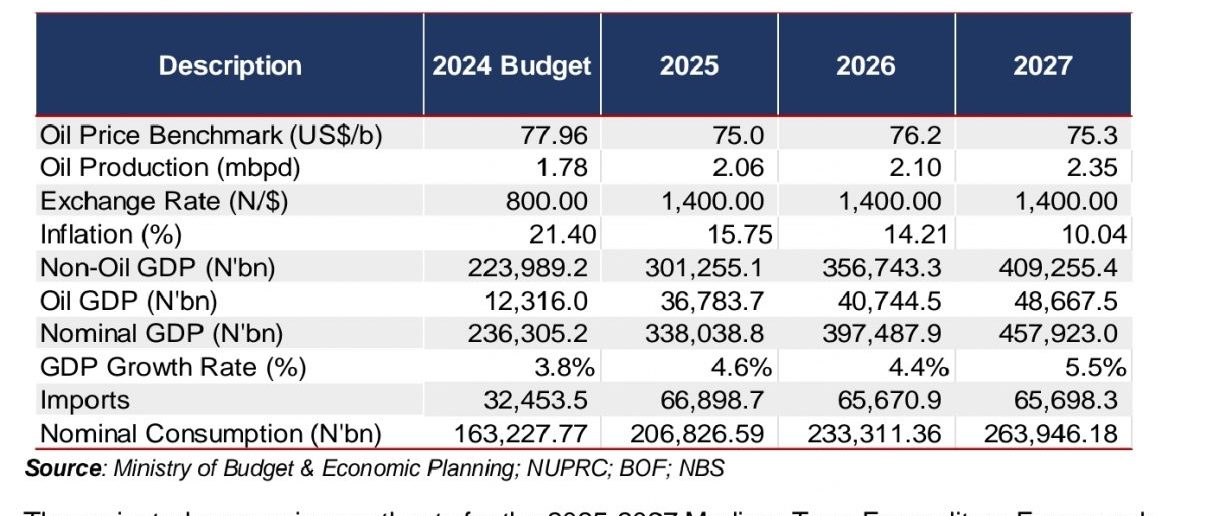
The 2025 budget further projected a deficit of ₦13.08 trillion, up from ₦9.18 trillion in 2024. This represents 38 per cent of federal revenues and 3.87 per cent of the projected GDP. The rise in the deficit is attributed to increased costs from the new minimum wage, pension obligations, and higher debt servicing. The government aims to reduce the deficit within the FRA’s limits in the medium term.
The government plans to issue $1.7 billion in Eurobonds and $500 million in Sukuk bonds to finance 2024’s budget deficit. Finance Minister Wale Edun revealed that the borrowing plan will be presented to lawmakers for approval soon.
Considering these efforts and their precedents, West Africa Weekly noted Nigeria’s growing reliance on borrowing. The planned Eurobonds and sukuk will contribute significantly to the country’s debt. Earlier this year, the government also announced plans for $500 million in domestic foreign currency-denominated bonds, although the plan was later withdrawn.
Delays and Shortcomings in the 2024 Budget
Under Section 11(1)(b) of Nigeria’s Fiscal Responsibility Act, the President must submit the MTEF to the National Assembly at least four months before the start of the next financial year. The MTEF, a medium-term framework, serves as a basis for the National Budget. However, as of November 18, 2024, the submission was 48 days overdue, missing the FRA’s deadline.
Lawmakers previously complained about the late submission of the 2024 budget in November 2023. Experts warn that budget delays disrupt financial planning and allow ministries to insert wasteful and fraudulent projects. Andrew Orlando, a stakeholder manager at BudgIT, noted that such insertions heavily contributed to the poor performance of the 2024 budget, which had only a 30 per cent impact.
Constituted with the power to add new projects or make allocations to the existing national budget, the National Assembly increased the capital expenditure budget from the proposed N7.72tn to N9.995tn. A report by BudgIT further showed that the National Assembly inserted 7,447 projects – amounting to N2.24 trillion – into the 2024 budget.
N176 billion (for 1,308 projects) was allocated to the senatorial districts, N212.9 billion for 1,150 streetlights, and N218.6 billion (for 1,777 projects) was allocated for federal constituencies, among other insertions.
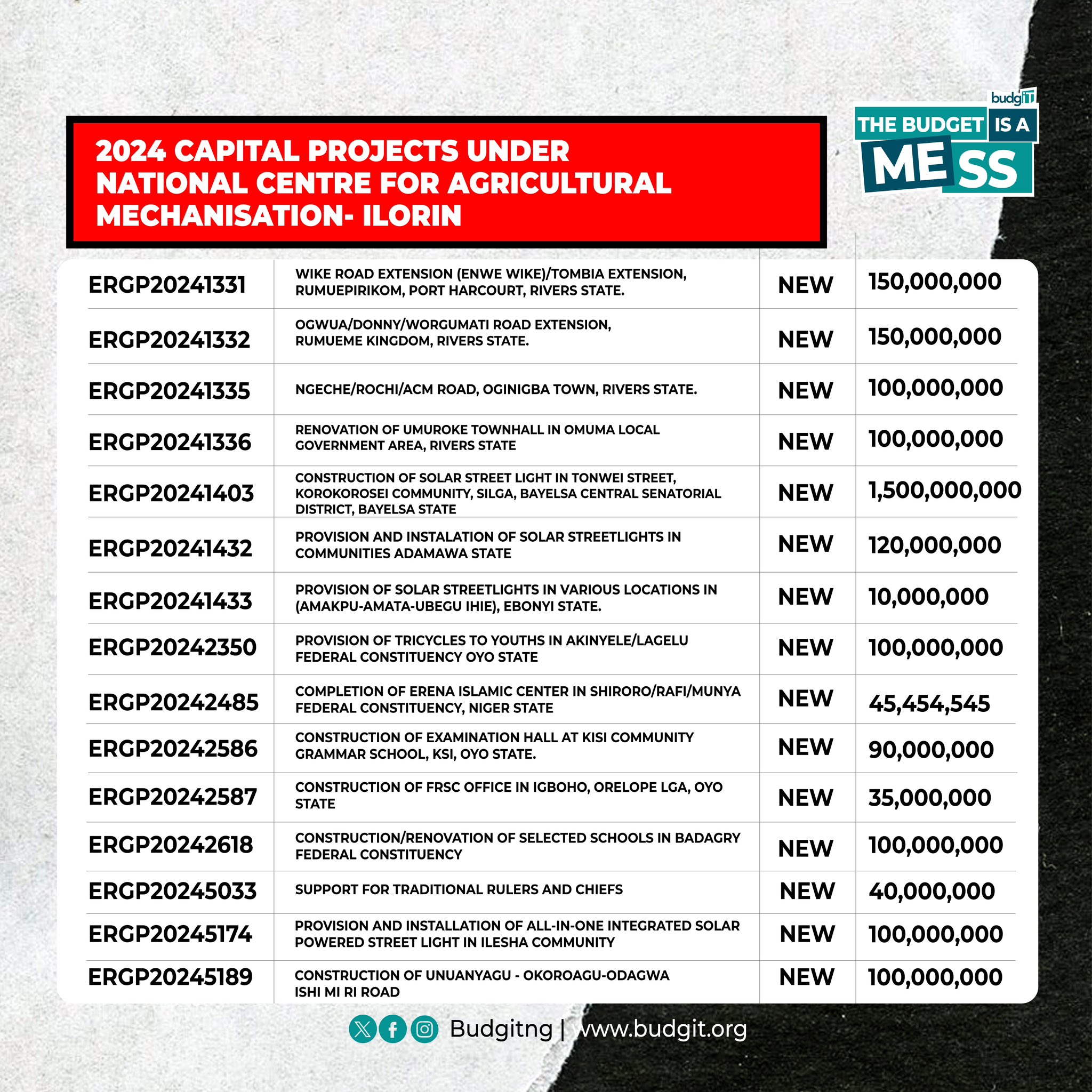
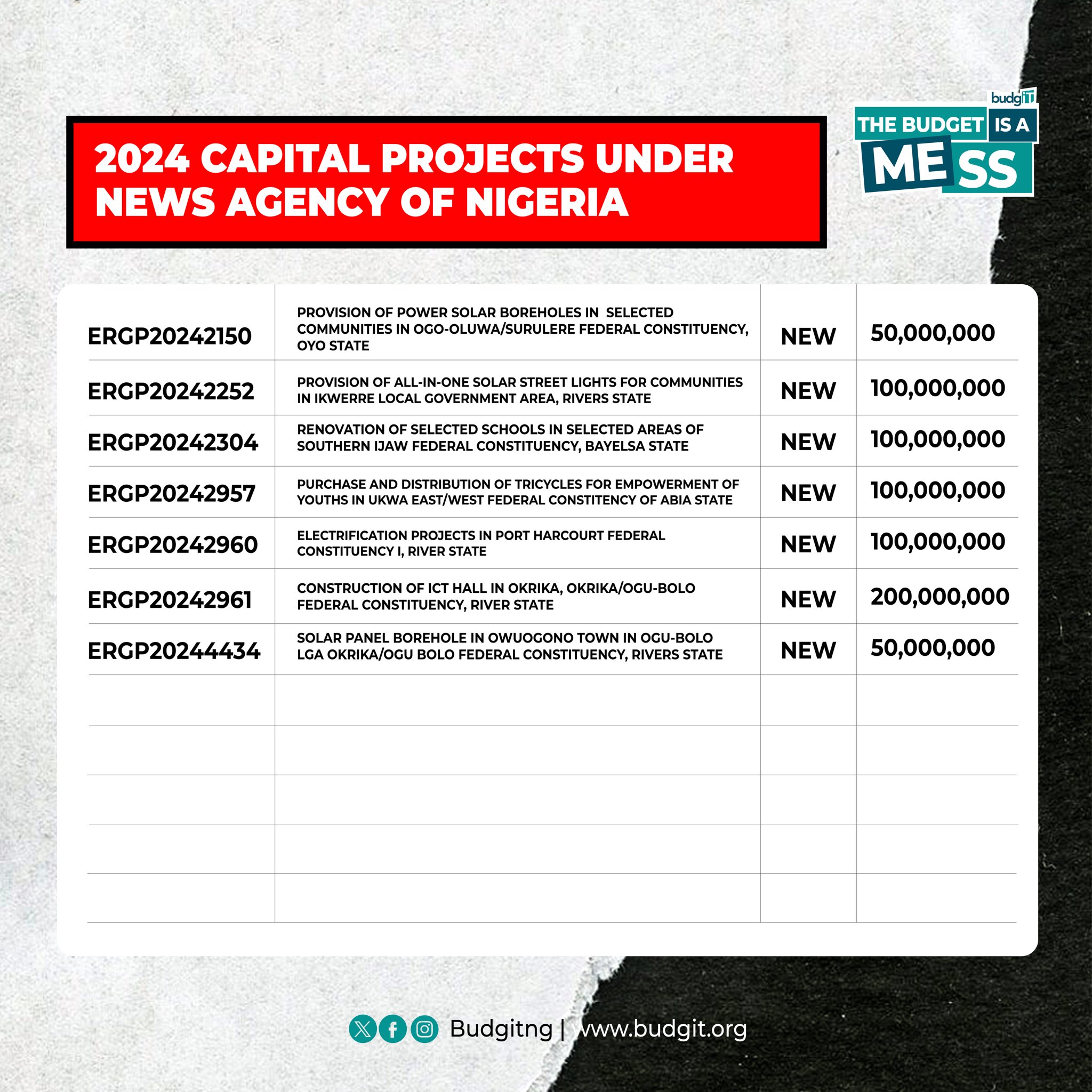
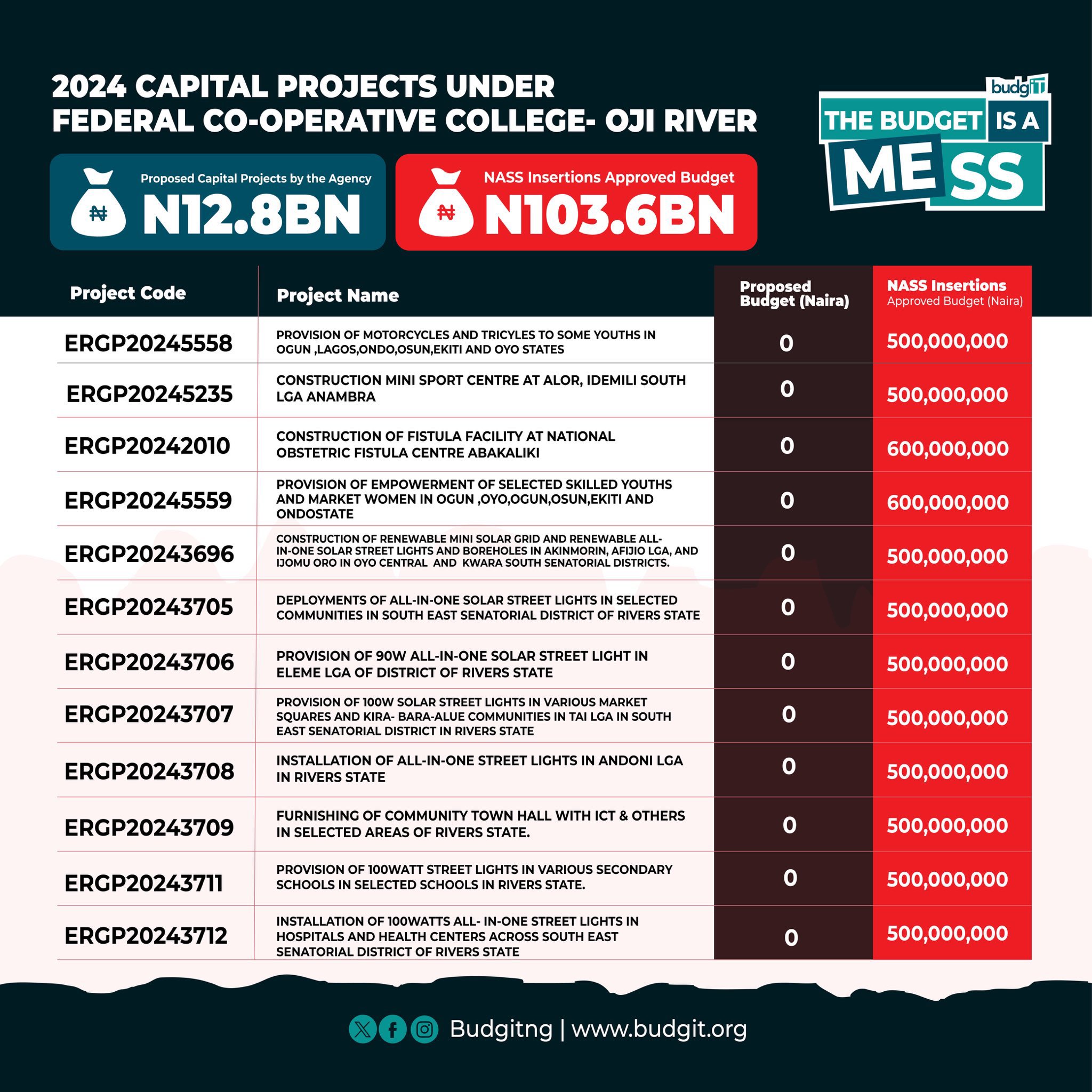
West Africa Weekly’s review of the 2024 budget found that while several billions were allocated to infrastructure, energy, education, and security, many challenges persist.
The budget allocated ₦1.32 trillion for infrastructure, including power, housing, aviation, and transport. ₦93.2 billion was further invested in a new technology to monitor the national grid. However, power supply remains inconsistent. Nigerians have lost count of the number of grid collapses this year. Transport and other aspects of daily living have skyrocketed. The aviation industry is not left out of the dilemma, as severe hardship has hit the sector, leading to huge losses and the temporary closure of Azman Airlines, among other challenges.
Although over 7.9 per cent of the budget was earmarked for education, the sector continues to struggle, with 18 million children out of school by May 2024. Meanwhile, 12 per cent (₦3.25 trillion) was set aside for security. However, insecurity continues to escalate. Kidnapping for ransom, blatant banditry, violence and mass abductions have become common crimes in Nigeria.
In healthcare, over 5 per cent (₦1.33 trillion) of the 2024 budget was allocated, but the sector still faces significant challenges. The economy also continues to suffer from high inflation, currently at 33.88 per cent, mainly due to the removal of the fuel subsidy, frivolous governing spending and unstable policies.
Given these ongoing issues with the 2024 budget’s delivery, many Nigerians are now questioning the expansion of the 2025 budget and asking, “Will it be yet another ruse?”
Read More:
- IG Urges Nigerians to Shun Use of Social Media to Report Police Misconduct Despite Concerns Over Transparency
- Malian Customs Seize €1.27 Million at Bamako Airport
About The Author
Mayowa Durosinmi
author
M. Durosinmi is a West Africa Weekly investigative reporter covering Politics, Human Rights, Health, and Security in West Africa and the Sahel Region
Related Articles
Ivory Coast to Buy Unsold Cocoa to Support Farmers
Ivory Coast has announced a government plan to purchase unsold cocoa stock...
ByWest Africa WeeklyJanuary 23, 2026Ghana Moves to Reclaim Kwame Nkrumah’s Former Residence in Guinea
Ghana has embarked on a diplomatic and cultural initiative to reclaim the...
ByWest Africa WeeklyJanuary 23, 2026Senegal Honors Players and Coach After AFCON Triumph
Senegal has formally honored its Africa Cup of Nations winning team, awarding...
ByWest Africa WeeklyJanuary 23, 2026Burkina Faso, Mali, and Niger Turn to Russia for Shared Telecom Network
Burkina Faso, Mali, and Niger have announced plans to develop the Sahel’s...
ByWest Africa WeeklyJanuary 23, 2026






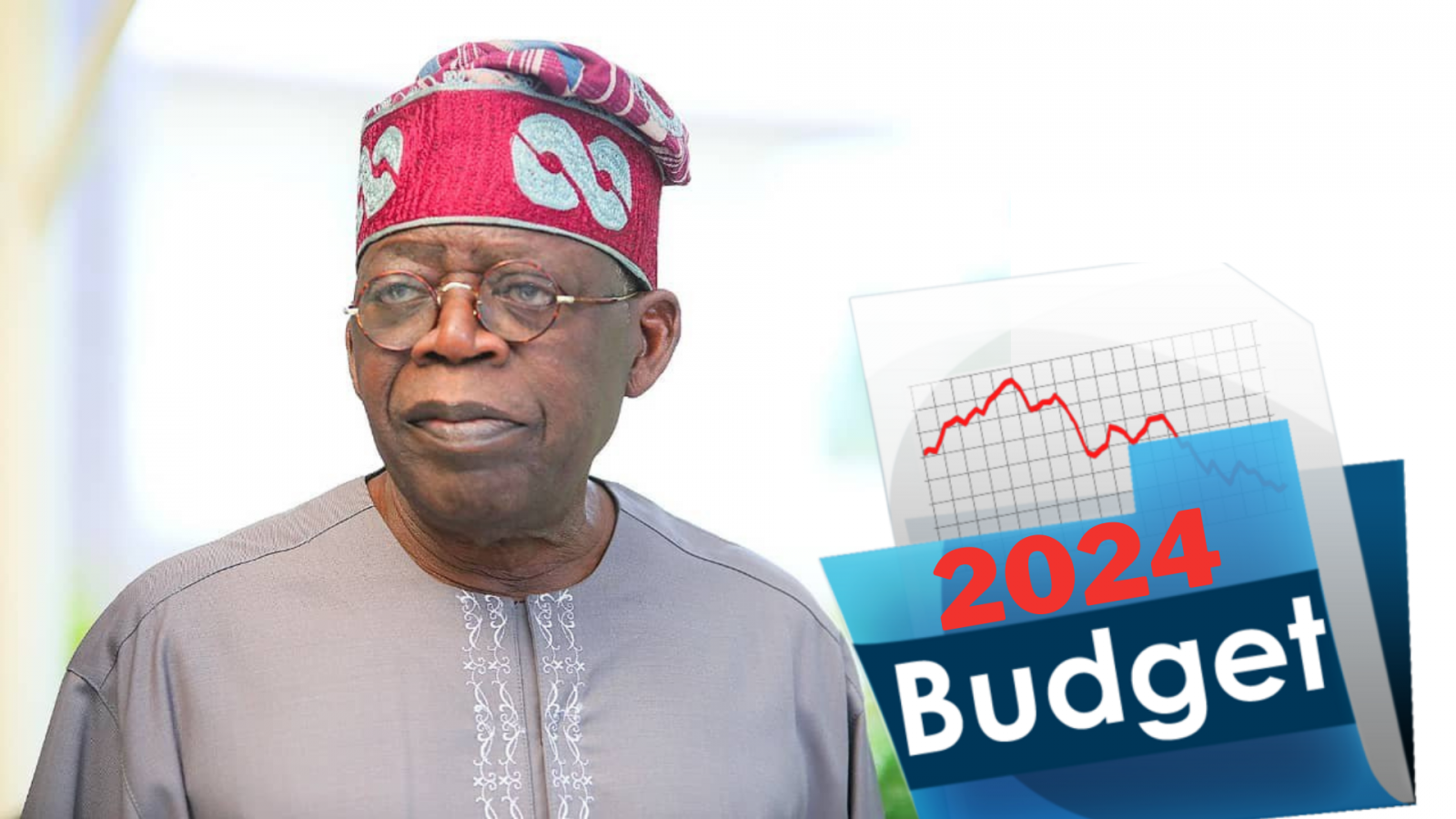






Leave a comment